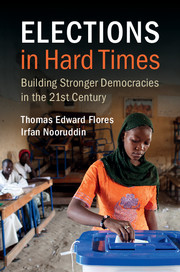Book contents
- Frontmatter
- Dedication
- Epigraph
- Contents
- List of figures
- List of tables
- Preface
- Part I From Elections to Democracy: Theory and Evidence
- Part II Challenges Facing Elections in Developing Countries
- 4 The Ephemeral Power of Contingent Legitimacy
- 5 Experience Matters: Democratic Stock and Elections
- 6 Starved States: Fiscal Space and Elections
- 7 Violent Votes: Conflict and Elections
- Part III Democracy Promotion for the Twenty-first Century
- Appendix A Data Appendix: Sample, Variables, Sources
- Appendix B Main Statistical Results
- Notes
- Bibliography
- Index
5 - Experience Matters: Democratic Stock and Elections
from Part II - Challenges Facing Elections in Developing Countries
Published online by Cambridge University Press: 05 September 2016
- Frontmatter
- Dedication
- Epigraph
- Contents
- List of figures
- List of tables
- Preface
- Part I From Elections to Democracy: Theory and Evidence
- Part II Challenges Facing Elections in Developing Countries
- 4 The Ephemeral Power of Contingent Legitimacy
- 5 Experience Matters: Democratic Stock and Elections
- 6 Starved States: Fiscal Space and Elections
- 7 Violent Votes: Conflict and Elections
- Part III Democracy Promotion for the Twenty-first Century
- Appendix A Data Appendix: Sample, Variables, Sources
- Appendix B Main Statistical Results
- Notes
- Bibliography
- Index
Summary
The electoral boom frequently brought elections to countries with little history of formal democratic governance. The average country holding its first multiparty elections during the earliest part of the Third Wave (1974–1987) did so with the benefit of seven and a half years of democratic experience – certainly not a long history, but one long enough to inform and educate politicians and citizens alike in the democratic process. The first multiparty elections in Greece at the dawn of the Third Wave are a good example. Despite military coups, autocratic rule since the 1960s, and a civil war in the late 1940s, Greece's 1974 elections were buttressed by nearly six decades of intermittent democratic rule in the nineteenth and twentieth centuries. Latin American countries holding founding elections during the 1980s shared Greece's history of intermittent democratic rule dating back over a century.
The countries of the electoral boom – largely concentrated in Sub- Saharan Africa and the former Soviet Union – often lacked the benefit of previous democratic rule. The average founding election during the electoral boom occurred in a country with only two and a half years of democratic experience, five years fewer than in 1974–1987. The countries of the Arab Spring are typical of this pattern. On the eve of the fall of authoritarian regimes in Tunisia, Egypt, and Libya, none had spent even a single year as a democracy; Libya, in fact, had experienced more military coups (three) than competitive elections (one)! Haiti also sadly exemplifies the challenge of elections in inexperienced countries. The Duvaliers, first François “Papa Doc” and then Jean Claude “Baby Doc,” had ruled the country with an iron fist from 1957 until 1986. Haiti had never been consistently ruled as a democracy. Elections in 1990 promised a new day for the impoverished country. Jean-Bertrand Aristide, a Catholic priest and himself an opposition leader during the Duvalier dictatorship, won two-thirds of the vote. He was deposed in a military coup the following year, only returning to office in 1994 after intervention from the United States. Aristide won re-election in 2000, though opposition candidates boycotted the election amidst accusations of improprieties during parliamentary elections earlier that year. He was deposed in yet another coup in 2004.
- Type
- Chapter
- Information
- Elections in Hard TimesBuilding Stronger Democracies in the 21st Century, pp. 96 - 119Publisher: Cambridge University PressPrint publication year: 2016



